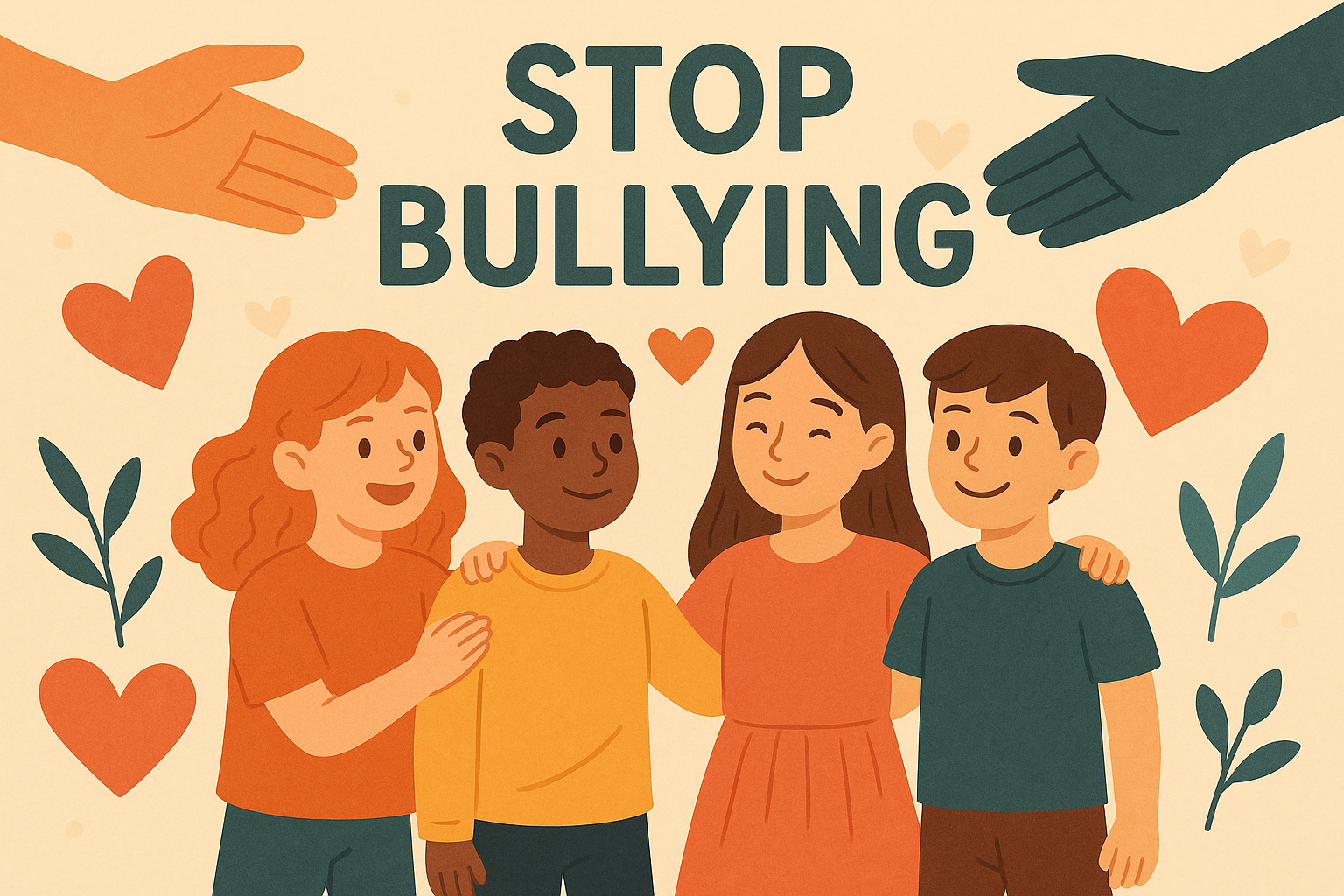Are you worried about bullying at your child’s school and unsure how to stop it? Recent news showed a shocking event where a kid gets forced by peers into dangerous actions, causing growing concern among parents.
In this post, you’ll learn clear steps and tips—like teaching empathy through simple acts (such as the message “she loves you”)—that can make schools safer and friendlier right away.
Read on to protect kids now from cruel situations like these.
Key Takeaways
Bullying affects one in five students ages 12 to 18, leaving many with physical harm, anxiety, depression, and sometimes suicidal thoughts.
Speaking up matters—if someone nearby intervenes, bullying usually stops within just ten seconds—but unfortunately, 80% of bullying happens right in front of others, who stay quiet out of worry or fear.
Students recover best from bullying through professional counseling, family encouragement, and personal outlets such as writing journals, creative art sessions, or physical exercise.
Schools that clearly communicate anti-bullying rules have fewer bullying issues, particularly if they also educate teachers, track incidents actively, and promote student support groups.
Parents can spot bullying if their child suddenly dislikes school, has unexplained bruises, or shows unexpected mood swings—sadly, students only report about 20% of bullying cases to an adult.
Table of Contents
The Incident: What Happened?

The video showed a group of teens forcing a smaller boy to jump from a high wall while they laughed and recorded it on their phones. The victim landed badly and hurt his ankle, but the bullies kept taunting him instead of helping.
Details of the bullying incident

Danny endured harsh and humiliating treatment at Camp Lions—far worse than typical teasing. Near the lake, a group of older campers cornered him, forcing him to leap off a high rock into shallow water.
They warned Danny they’d beat him up if he refused. Alone and scared, he saw no adults nearby to step in. The bullies recorded everything on their phones, laughing loudly while Danny stood frozen at the edge.
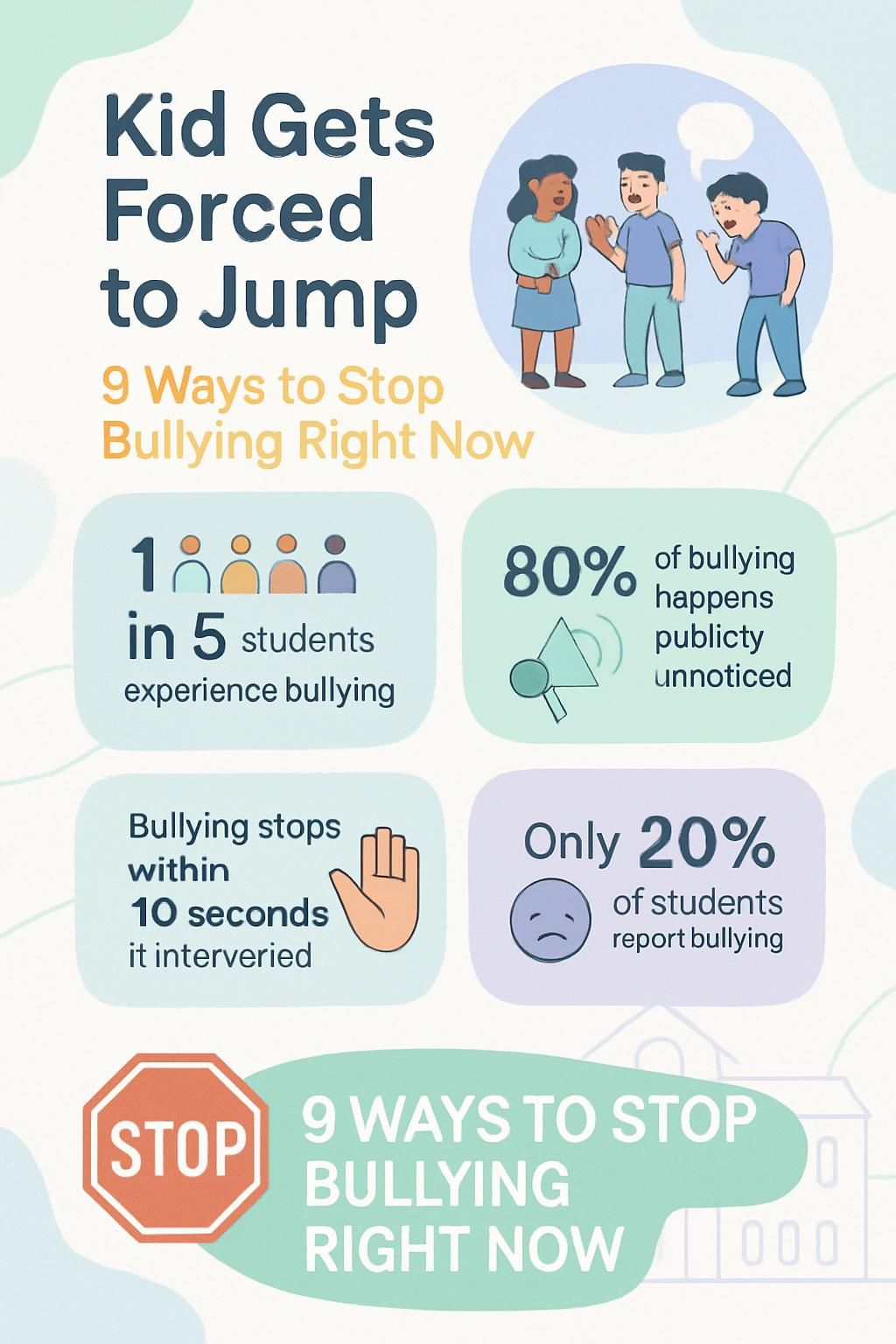
Sadly, physical bullying like this isn’t rare. Around 20% of students aged 12 to 18 face bullying in schools, according to studies. I once saw another kid pressured into doing something unsafe; the terrified look on his face still bothers me today.
On top of that, Danny’s bullies even made up cruel rules for him to follow. They forced him to hand over his lunch, carry their heavy backpacks between camp activities, and constantly obey their demands.
The moment of the forced jump
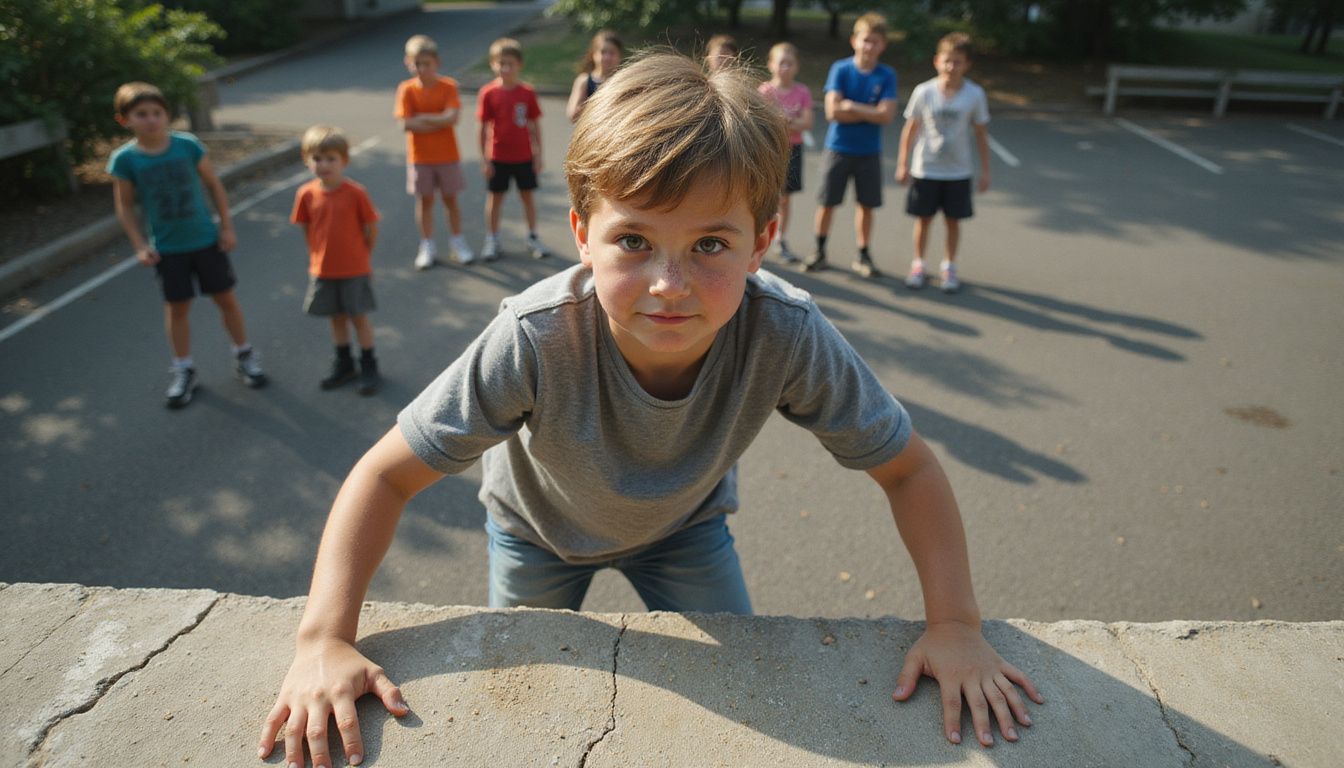
The incident took place at the far edge of the school yard. A group of kids surrounded Danny, their faces twisted into cruel smiles. They taunted and jeered, pointing at the steep drop behind him, daring him to jump—or they’d push him themselves.
Terror gripped Danny as his legs trembled uncontrollably. Slowly, the bullies crept closer, their threats louder and harsher by the second. He glanced down nervously, eyes wide with fear at the ten-foot plunge onto hard concrete.
Tears filled Danny’s eyes, as he knew nobody planned to step forward to help. The leader began counting down loudly from five, each number causing Danny’s pulse to race faster. At “one”, he squeezed his eyes shut, leaned backward, and plunged downward, his screams piercing through the playground noise.
Danny hit the ground hard, leaving him with a broken wrist and badly bruised ribs. Though the pain stabbed sharply through his body, the humiliation and shock inside hurt far worse.
Cruelly, the bullies had captured every second on their phones. By lunchtime, the video had already spread everywhere—shared across the entire school. Teachers found out only later, once Danny’s parents rushed him to the hospital.
This incident highlights clearly how bullying quickly moves beyond harsh words, escalating in moments to real physical danger. The emotional wounds from trauma like this often linger far longer than the physical injuries themselves.
The Impact of Bullying on the Victim

Bullying scars kids deep inside, causing pain that can last for years. Victims often struggle with low self-worth and fear going to school, which affects their grades and social life.
Emotional and psychological trauma
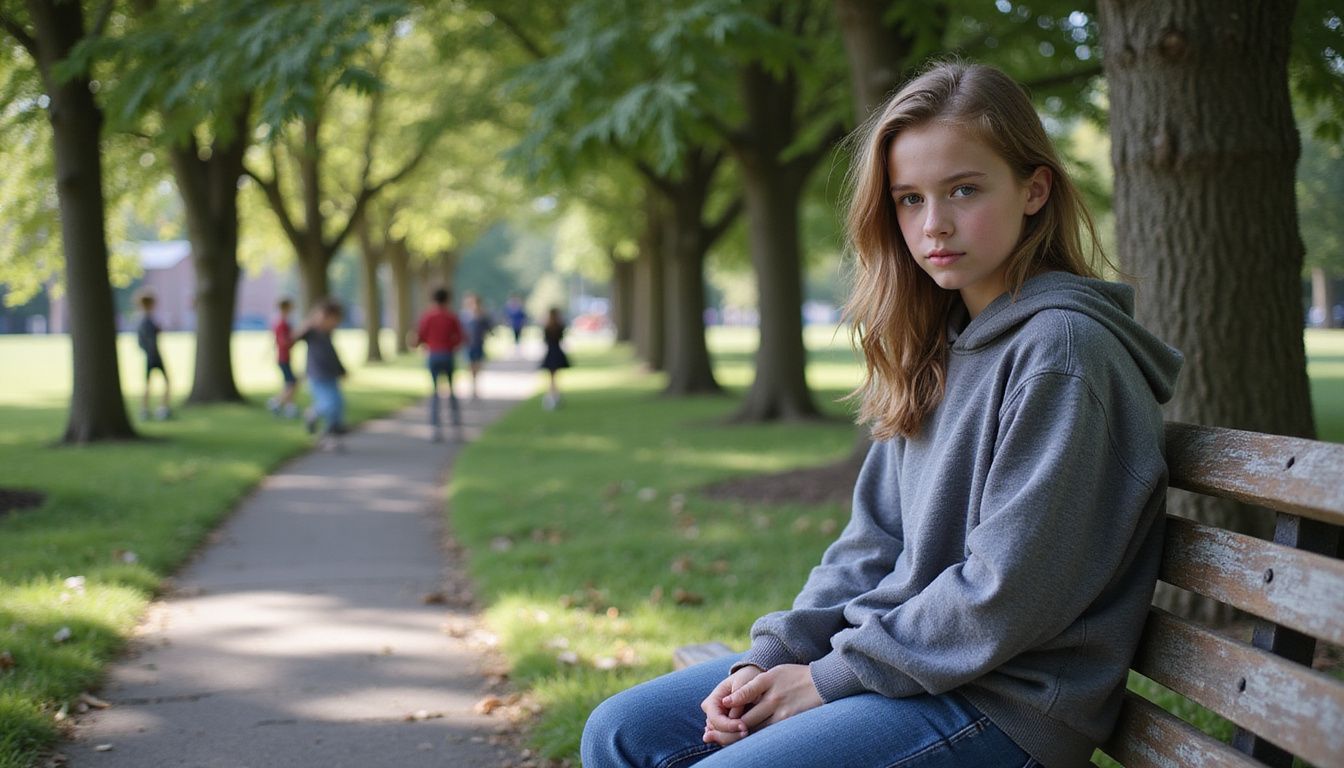
Kids who face bullying often deal with lasting mental health troubles. Research reveals a troubling figure—93% of cyberbullying victims experience anxiety, depression, and loneliness.
I’ve watched children lose their joyful spark after endless cruel teasing and threats. Their confidence starts fading, and they begin believing hurtful comments from others. Soon enough, sleep issues and panic attacks creep in, along with nervousness about attending school.
These daily battles quickly weaken their grades and friendships.
The scars you can’t see are the hardest to heal.
Sadly, ending bullying doesn’t always end the trauma. Many victims have trouble trusting others, making it hard to build good friendships later. They sometimes stop joining sports or hobbies that once excited them or suddenly act differently in worrying ways.
Severe mental strain can even trigger thoughts of suicide in serious situations. Parents usually notice the change as their child shifts from lively and sure of themselves to withdrawn and quiet.
Quick action—like seeking help from a mental health expert and offering steady family support—makes a big difference.
Physical consequences

Bullying leaves clear marks on the body, ones that everyone can notice. Cuts, bruises, and broken bones appear after physical fights. Some children even get headaches or stomachaches just from the stress of facing bullies.
Anxiety and fear can cause real physical problems in kids’ bodies. Many bullied children struggle to fall asleep—tossing, turning, and waking up tired. This lack of sleep weakens their immune systems, causing them to become sick much easier.
School nurses say bullied students often arrive complaining about symptoms with no obvious medical reason. These physical issues can show up before children tell someone they’re bullied.
Eating habits also shift, causing noticeable weight changes as some kids try coping through food. The effects bullying has on the body go beyond school grounds and impact a child’s complete health.
Emotional pain from bullying can linger even longer than visible injuries.
The Role of the Bystanders

Bystanders often hold the key to stopping bullying but stay quiet out of fear or confusion. Their actions (or lack of them) can either fuel the bully’s power or help the victim find safety.
Why bystanders stayed silent

Most kids stay silent if they witness bullying. Fear stops them from acting. I once saw a group of teens quietly ignore a classmate getting shoved around—they worried they’d be next.
Research finds that someone witnesses bullying in around 80% of cases, yet chooses to remain quiet. Students often fear they’ll become targets if they step up. Many also worry they’ll lose friends or get labeled a snitch.
Peer pressure strongly influences their silence. Often, students simply have no idea how to react in these moments, so they freeze. Some kids believe it’s not their issue to handle.
Girls, especially, report feeling powerless in bullying situations. Sadly, many young people aren’t equipped with ways to stand up safely. Schools across the country must make it a priority to provide students with clear, practical skills for speaking out safely.
The importance of intervention
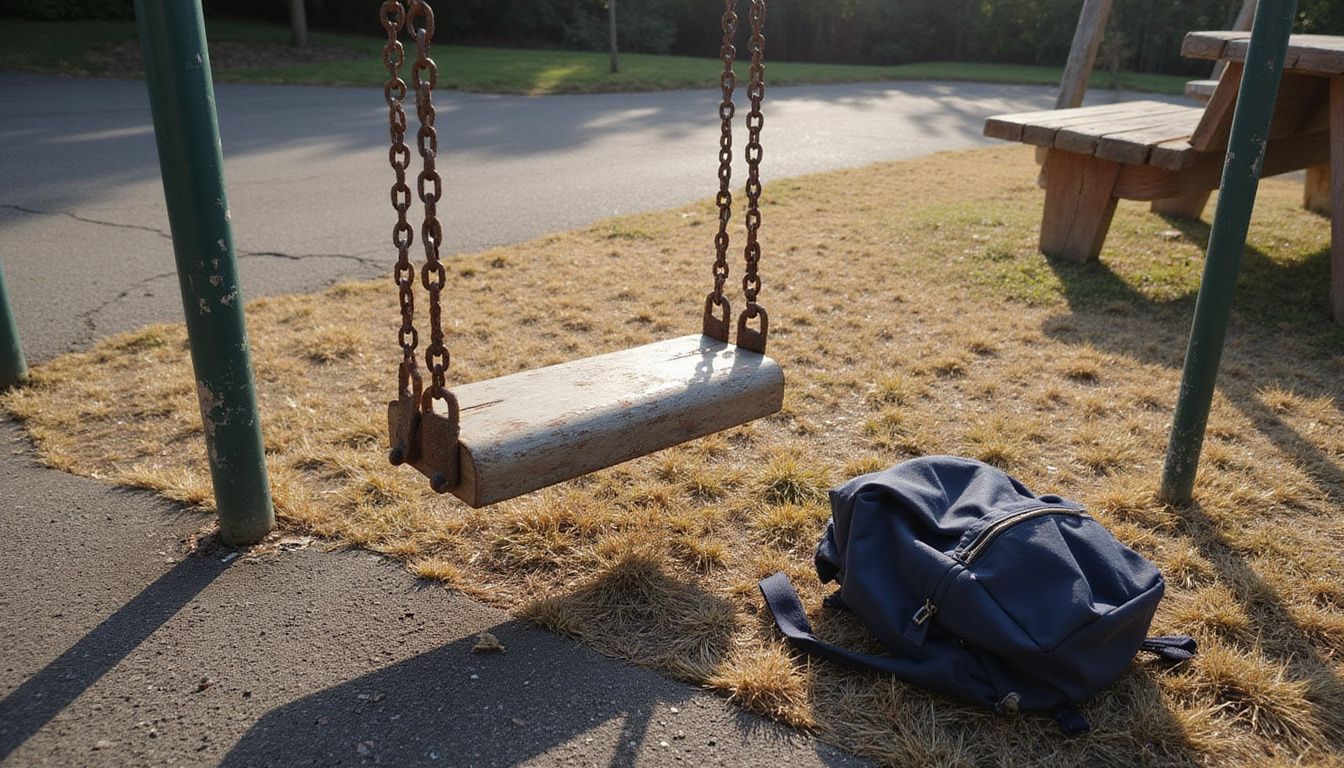
Bystanders often stay silent—but speaking up can truly change things. Taking action helps stop harm and protect others from bullying. Research shows, if someone intervenes, bullying usually stops within 10 seconds over half the time.
Quick intervention can prevent serious physical injuries and emotional pain for the victim.
I’ve watched one brave voice completely shift a bullying situation. Around 80% of bullying happens with bystanders present, giving them real power to make a difference. You don’t have to become a hero—even little actions matter greatly.
Just clearly saying “stop”, or quickly getting an adult involved, can protect someone from lasting trauma. Standing up shows the victim they’re supported, and clearly signals to bullies their actions won’t be tolerated.
The Response from Authorities

School officials often fail to act fast enough when bullying happens. Parents must push for clear answers and real action from those in charge.
School’s reaction to the incident
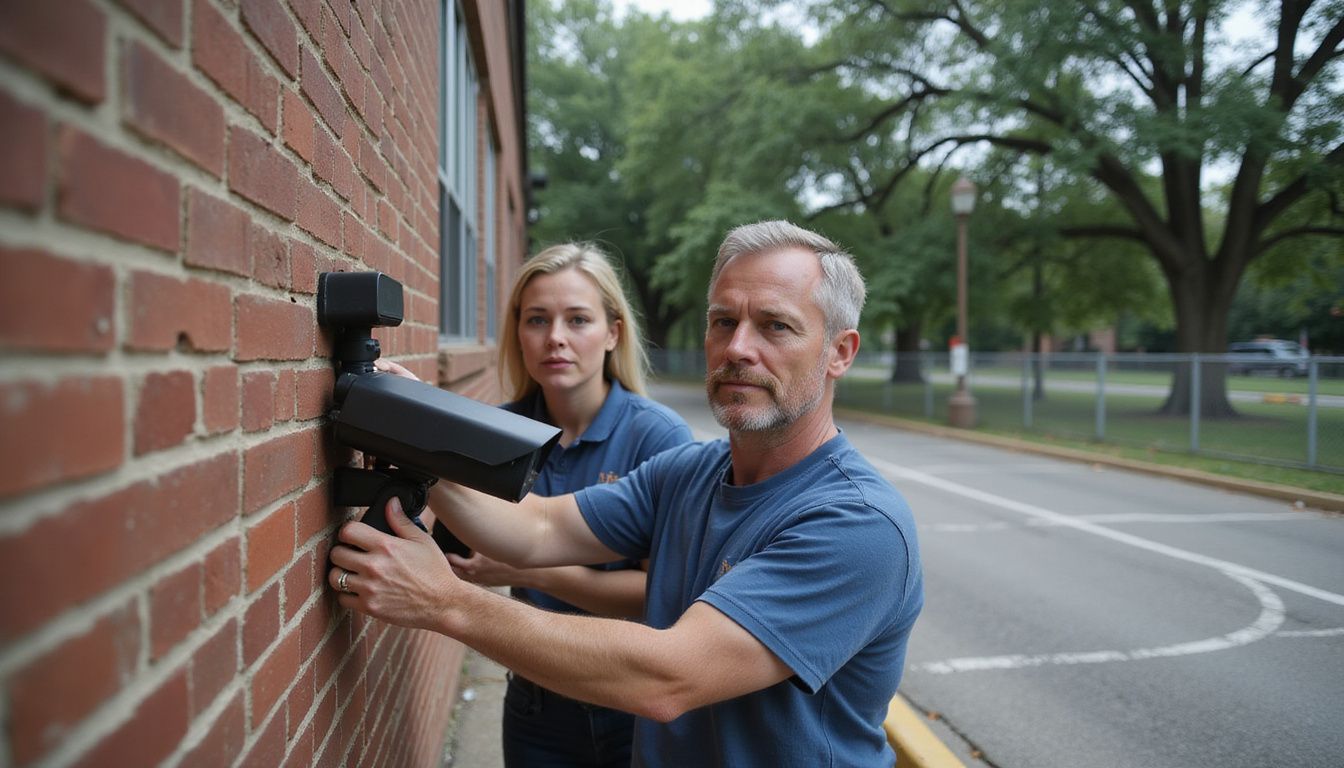
Too many schools respond slowly after bullying happens—but Lincoln Middle School acted fast. Right after learning about the forced jumping incident, the principal called an emergency meeting with staff and the affected families.
The school counselor spoke with the victim each day for two weeks, helping him cope emotionally. Teachers attended extra training sessions about recognizing bullying in classrooms.
Schools with clear anti-bullying guidelines generally experience fewer harassment cases, yet many still lack effective plans.
I’ve personally noticed how solid educator training truly helps in bullying cases like this. The school board quickly approved money for new monitoring systems, installing equipment in hidden areas where harassment commonly occurs.
They also launched peer support groups, guided by student leaders trained for these roles. Administrators clearly communicated that bullying leads directly to serious consequences.
Parents also got informational resources, offering guidance about discussing bullying with their kids. Taking proactive steps, rather than simply reacting after problems arise, helps schools create safer environments—just as mentioned here: Schools can improve safety and security.
Community and law enforcement involvement
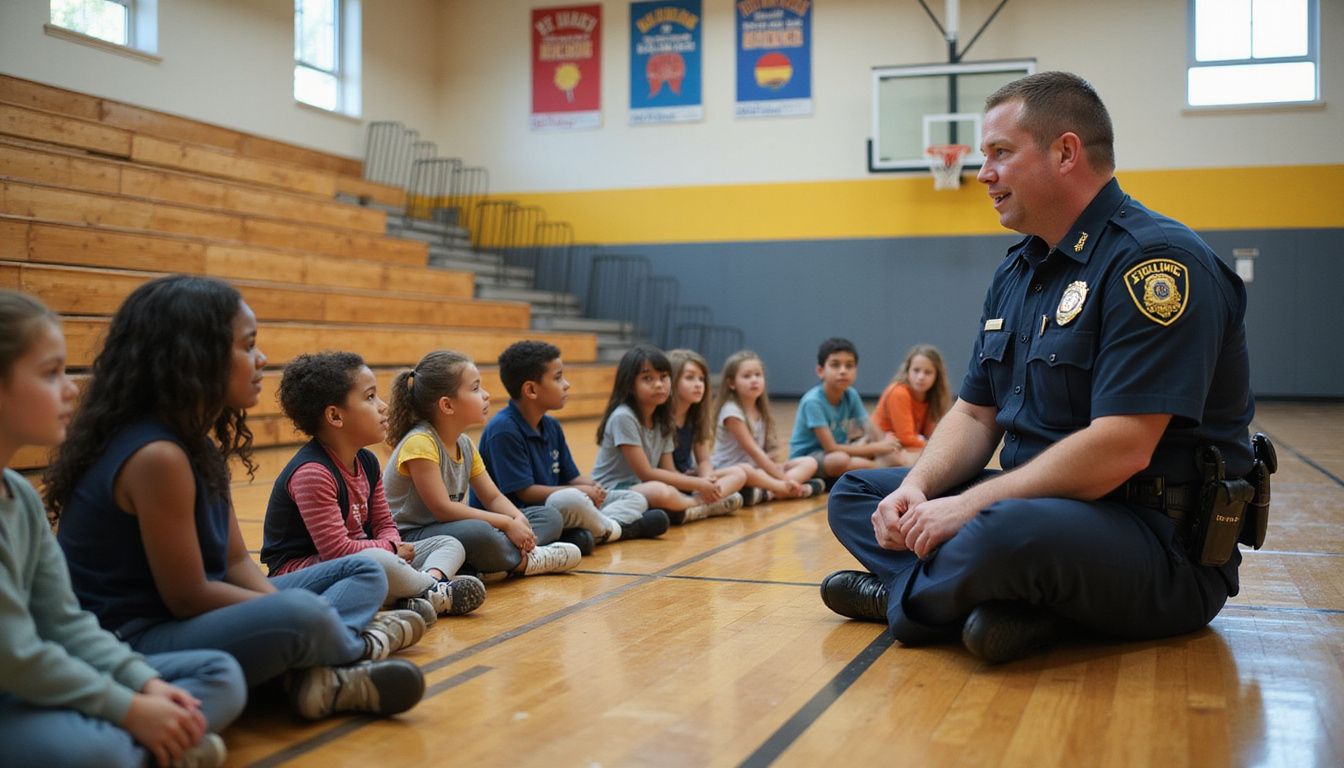
Local police officers can truly help stop bullying at school. I’ve personally watched how officers who form good bonds with kids make schools feel safer. Many cops even join school anti-bullying groups, talking directly with students about kindness and respect.
Through programs like DARE, police get special training so they can better talk to kids and encourage them to speak out against bullies.
Safety in schools requires teamwork between parents, teachers, and local law enforcement.
Having officers visit classrooms lets children see police as friendly, helpful adults—not someone to fear. Community watch groups also help out, keeping close tabs on school property during evening hours.
Parents working closely with police build stronger safety nets around each child. By teaming up, everyone stays focused on one clear goal—keeping our kids safe from harm.
The Journey of Resilience

The road back from bullying takes grit and time. Kids who face these tough moments can grow stronger with the right help and support.
How the victim coped with the trauma

Kids facing bullying often discover unexpected ways to heal and grow stronger after trauma. Although bullying can force kids to mature quicker than friends their own age, effective support helps them develop positive ways to cope.
- Open conversations with adults who could be trusted helped the child work through feelings of shame and fear left from the bullying.
- Writing daily in a private journal provided a safe outlet to honestly express difficult emotions without feeling judged.
- Using art therapy provided an outlet for complicated emotions too tough to explain in words, especially in early recovery.
- Regular visits with a trauma-trained child psychologist offered helpful tools to control anxiety and manage traumatic flashbacks.
- Making new friends who offered support and understanding provided a critical sense of safety, connection, and comfort.
- Physical activities, like swimming and running, burned off stress and improved sleep patterns disrupted by bullying incidents.
- Gaining knowledge about PTSD helped the child realize that difficult feelings and reactions were normal after experiencing trauma.
- Becoming part of a support group created connections with peers who had faced similar bullying experiences and truly understood.
- Creating small, manageable goals each week helped rebuild confidence lost during episodes of bullying.
- Family counseling sessions taught parents helpful ways to support their child’s recovery, while also managing their own feelings along the way.
Support from family and friends

Family support offers bullied children a safe place to recover and heal. Parents who truly listen, without judgment, show their child how valued they are, even during difficult situations.
Brothers or sisters can provide comfort through small gestures—like sharing snacks or watching movies together. This trusted circle helps kids feel less alone, especially while dealing with bullying.
A child surrounded by love has the strength to face any bully.
Friends play an essential role in healing as well. Loyal buddies who stay close at school help shield a bullied child from further harm. Through simple daily kindness, these friends boost a child’s self-esteem bit by bit.
Active listening from family and friends allows the child to openly express feelings and gradually move forward. Such steady support becomes the foundation for regaining confidence after experiencing bullying actions like being pressured to jump or enduring other harmful challenges.
Seeking professional help

Professional support helps bullied kids heal in meaningful ways. Therapists offer safe environments, giving children room to share emotions openly and without fear. Parents often first spot trouble through changes like sleep issues, sudden mood shifts, or falling school grades.
In tough times—and for urgent situations—the Suicide and Crisis Lifeline (988) remains available anytime, day or night. School counselors can also provide initial guidance, connecting parents and children to mental health experts with special training.
Finding proper help changes everything for a child in recovery. Mental health specialists use proven techniques to restore a child’s self-esteem and confidence. They help kids manage trauma experiences and teach healthier emotional skills to face life’s daily challenges.
Ideally, parents should choose therapists who understand childhood bullying and trauma specifically. Beyond individual treatments, communities can work together, raising public awareness about bullying and highlighting its lasting emotional impacts.
Raising Awareness About Bullying

Raising awareness about bullying starts with teaching kids to spot the warning signs. Schools must create safe spaces where students learn to stand up for each other and report harmful actions.
The importance of recognizing the signs
Moms need to notice bullying signs early—before things get worse. Watch out for sudden shifts in your child’s routine, like resisting going to school or coming home with ripped clothes.
If your kid stops sharing details about their day or suddenly struggles with lower grades, those could be important clues. Unexplained bruises, scratches, or marks are clear warnings and shouldn’t be ignored.
Lost items, or frequently asking for more money without a good reason, can also point to trouble at school.
Sadly, bullying often stays hidden—with only about 20% of incidents reported to adults. This silence makes it harder to support kids who need help the most. Kids may worry about “tattling”, but speaking out is brave and helps keep them safe.
Check for unusual moods like anger, sadness, or isolation, as these often indicate bullying issues. If your instincts say something isn’t quite right with your child’s friends or emotions, pay close attention and step in early.
Educating children about empathy and kindness
Being aware of bullying signs goes hand-in-hand with teaching kids to care about others. Building empathy early gives kids a strong defense against mean actions—and I’ve watched this happen right in my own classroom.
In fact, a recent study found that third graders who completed a five-day empathy program showed greater kindness to classmates. What’s more, verbal bullying dropped significantly once teachers joined these empathy sessions.
Kids learn best through real-life examples of kindness in action.
Daily, simple activities help children develop these important skills. For instance, role-playing games allow kids to imagine being someone else—and feel what they feel. Storytime using books about friendship gives young ones clear examples to follow.
Positive words also prove more effective than punishment; notice children acting kind, then highlight it openly. At home, parents can show empathy through everyday actions, like expressing feelings or helping neighbors.
The true aim isn’t simply preventing bullying…it’s raising caring people who naturally support each other.
Prevention Strategies

Effective bullying prevention needs clear, simple plans. Easy-to-follow tactics stop hurtful behavior early—and keep every kid feeling safe. Setting clear guidelines helps students understand expectations, reducing harm and promoting respect. Small efforts like school workshops, class talks, and role-play exercises can spark big changes. A clear reporting system, with private boxes or online forms, encourages kids to speak up safely.
Teachers can check common areas, such as hallways and playgrounds, more often to prevent bullying. Open communication between students, parents, and school staff helps identify issues early. Practical and straightforward rules create environments where kids feel secure, welcome, and valued.
Encouraging open communication
Open conversations with your kids build trust and safety—they really do. I’ve noticed this clearly with my own children; they open up more if they feel heard, not judged. Parents need to make room at home for kids to talk about hard topics like bullying.
Setting aside time each day to ask about school and friends helps. So does truly paying attention to what they say. Children who feel safe talking at home tend to report bullying early, before it escalates.
Schools have a big part to play here, as well. Teachers need to regularly check on students and notice signs of potential trouble. Holding class meetings for kids to openly share their worries works wonders.
The important part is for every adult, at home and school, to respond carefully and act immediately after hearing about issues. Kids who see adults stepping in to help—without adding more trouble—will continue to talk openly.
Clear communication between kids, parents, and schools creates a strong front line against bullying.
Anti-bullying programs in schools
Schools throughout America now rely on proven anti-bullying programs—and they’re making a real impact. Programs such as KiVa show students how to recognize bullying and help others safely.
I’ve personally noticed how effective these lessons are at my daughter’s school, with students learning through role-playing games and group discussions. The outcome is clear: KiVa has reduced school conflicts by nearly 80% through clear, simple steps.
These programs don’t just say, “Don’t be a bully”. Instead, they help kids understand empathy and provide practical tips on how to respond if someone gets picked on. Many schools create “buddy systems”, pairing older kids with younger students to build safer, friendlier environments.
Teachers also receive special training to notice problems early, stopping minor issues from turning serious. The activities keep kids engaged, too—they have fun while picking up helpful social skills that benefit everyone involved.
Empowering children to speak up
Kids depend on strong support to face bullying and find their voice. Your encouragement helps transform a silent child into a confident kid who knows their own value.
- Set up a comfortable place at home for conversations, so your child can speak openly without fearing judgment or criticism. I did this with my son after he experienced bullying at recess, and the chats before bedtime gave him confidence to talk to his teacher.
- Give your child clear phrases to use, like “Stop, I don’t like that”, and “That’s not okay”. Short, clear statements help a lot during stressful moments.
- Act out potential bullying situations at home, practicing responses ahead of time. This rehearsal helps kids feel ready and builds courage to act in real situations.
- Offer praise if your child reports bullying—whether directed at them or someone else. Over 57% of bullying incidents stop after peers step up and speak out.
- Guide your child to recognize how reporting bullying differs from tattling. Reporting means keeping someone safe; tattling just intends to get someone else in trouble.
- Build a network of parents to support all kids in speaking openly about bullying. Connecting with other moms helps create community-wide support.
- Tell your child about other kids who spoke up and made a difference. Hearing real-life success stories helps make bravery feel achievable.
- Teach your child that sometimes ignoring bullying can be very effective. Without the reaction they want, bullies often lose interest and stop on their own.
- Stress to kids that expressing concerns protects themselves and others who might stay silent. Speaking up helps everyone around them stay safe.
Up next, we’ll talk about new approaches and tools coming in 2025 that can help protect our children from bullying.
How Will the Fight Against Bullying Evolve in 2025?

By 2025, schools will rely on smarter tech tools to catch bullying early—before it can grow worse. Clever apps will let students quickly report hurtful actions right from their phones or school-issued tablets.
These digital tools will recognize troubling patterns, then alert teachers immediately—so adults can step in fast. As a school counselor, I’ve noticed firsthand how rapid responses can stop bullies cold.
Social media companies face rising pressure to make their platforms safer for young users. Soon they’ll roll out stronger filters and AI-driven systems that detect hurtful comments or harmful content.
Parents will gain greater control, using special dashboards to check exactly who interacts with their child online. With improved training and smarter digital tools, victims will gain support—and even bystanders will learn to step up effectively.
People Also Ask
What are the warning signs that a child is being bullied at school?
Keep an eye out for ripped clothing or lost belongings. Your child might seem suddenly sad, anxious, or withdrawn—moods changing without clear reason. They may refuse to go to school, struggle sleeping, or avoid talking about classmates and school events.
How can parents help stop bullying?
Open conversation matters most—talk honestly and regularly with your child about bullying. Encourage kids to speak confidently, stay calm, and walk away from bad situations. It’s also helpful for parents to communicate closely with teachers and school staff, so problems get solved quickly and safely.
What should a child do if they see someone being forced to jump or do other things they don’t want to do?
Kids should immediately inform a trusted adult—like a teacher or parent—if they witness bullying. Trying to stop it alone can be dangerous, so getting adult help is necessary. Later, children can comfort the person targeted, making sure he or she understands they’re not alone.
Why is it important to address bullying immediately?
Acting quickly stops bullying from escalating and causing lasting emotional harm—such as depression or anxiety. Immediate action shows children adults care deeply about their safety, creating a kinder and healthier school atmosphere for everyone.
References
https://www.stompoutbullying.org/what-do-if-your-child-being-bullied-and-resources
https://pmc.ncbi.nlm.nih.gov/articles/PMC9271952/
https://pmc.ncbi.nlm.nih.gov/articles/PMC4126576/
https://www.mcleanhospital.org/essential/bullying-kids-teens
https://www.stopbullying.gov/bullying/effects
https://www.stopbullying.gov/prevention/bystanders-to-bullying
https://www.stopbullying.gov/resources/research-resources/bystanders-are-essential (2021-05-21)
https://pmc.ncbi.nlm.nih.gov/articles/PMC5363950/
https://pmc.ncbi.nlm.nih.gov/articles/PMC7841334/
https://www.stopbullying.gov/prevention/support-kids-involved
https://www.stopbullying.gov/resources/get-help-now
https://www.stopbullying.gov/bullying/warning-signs (2021-11-10)
https://pmc.ncbi.nlm.nih.gov/articles/PMC10044840/
https://www.stopbullying.gov/prevention/how-to-prevent-bullying (2021-11-10)
https://pmc.ncbi.nlm.nih.gov/articles/PMC9878318/
https://3rdmil.com/9_strategies_for_students_to_stand_up_to_bullying/
https://kidsmentalhealthfoundation.org/mental-health-resources/bullying/combat-bullying-tips
